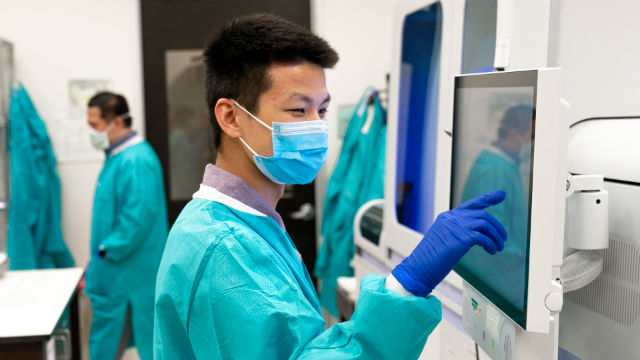UC San Diego Health pathology laboratory staff are working closely with doctors to treat coronavirus patients. Meanwhile, the National Institutes of Health has granted UC San Diego researchers $6.7 million to develop and test technologies for non-invasive examinations of immune cells in tumors. These cells, known as macrophages, play a crucial role in normal inflammatory responses and are also found in solid tumors. The density of macrophages in a tumor can impact its response to treatment, making it essential to count them non-invasively to determine the most effective therapies.
Professor Eric Ahrens from the Department of Radiology at UCSD School of Medicine stresses the importance of visualizing a patient’s inflammatory sites throughout their body. He emphasizes the value of accurate clinical diagnosis and precise therapeutic interventions. However, current biopsy techniques are invasive, and some tumors may be inaccessible for biopsy. Therefore, developing new whole-body imaging technologies is urgently needed to provide more accurate and less invasive options for cancer diagnosis and treatment.
The research team will use funding from the NIH grants to test a technology known as TAM-Sense, which involves feeding macrophages small drops of a biologically inert dye for detection by magnetic resonance imaging (MRI). This technology will be tested on patients with recurrent head and neck tumors, marking its first application in human patients. In addition to cancer, TAM-Sense has potential clinical applications for other diseases with inflammatory components such as autoimmune disorders, cardiovascular diseases, and infectious diseases. The imaging tools developed could help pinpoint anatomical locations of inflammatory sites for more precise pain management.
In summary, UC San Diego researchers are working on developing new technologies that can help diagnose and treat cancer more effectively using non-invasive techniques. The development of whole-body imaging technologies is vital to providing better options for patients who cannot undergo invasive procedures like biopsies or MRI scans due to safety concerns or accessibility issues.
The National Institutes of Health (NIH) have awarded $6.7 million grants to UC San Diego researchers aimed at developing and testing new technologies that can detect immune cells in tumors noninvasively through MRI scans.
Macrophages are involved in normal inflammation responses and are also present in solid tumors; therefore it’s essential to count them accurately before choosing therapies.
The research team will use these grants money on TAM-Sense technology that uses MRI scans to detect macrophages by feeding them small drops of biologically inert dye.
This technology will be tested on recurrent head and neck tumor patients marking its first application on human patients.
TAM-Sense has potential clinical applications beyond cancer such as autoimmune disorders or cardiovascular diseases.
Overall this development could improve pain management precision by locating anatomical sites where inflammation occurs



